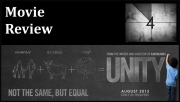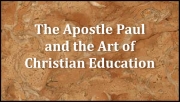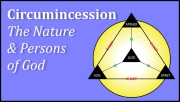
Last year during our study of Acts we summarized the meaning of many of the Feasts of the Lord. To refresh your memory, there are seven feasts God himself implemented in the book of Deuteronomy that the people of Israel were to celebrate every year. There are four feasts in the Spring and three in the Fall. All of the feasts have two distinguishing characteristics, they look back at a time God rescued the people of Israel (even before the nation existed) and look forward toward a prophecy about the Messiah. The prophecies found in the four Spring feasts were all fulfilled during Jesus’ first coming and were accomplished on the actual feast days, the last three will be realized in the same way. The first of the three Fall feasts is Rosh Hashanah, and it starts today (Sunday September 13, 2015) at sunset.
Read more: Rosh Hashanah

My junior year of college a fellow undergraduate running for student body president had “Unity” listed as part of his campaign platform. His oath was to unify the student body. During a debate one moderator asked the candidate, “How much unity does the student body have now? How do you intend to increase unity? And how do you measure unity so you know if you have accomplished your goal?” The candidate squirmed. Unity is a nice idea but is difficult to quantify.
Read more: Review: Unity

We should start by saying that the word “moderation” does not appear in the Bible, but the concept is taught throughout. The Greek words often translated as “moderation” are usually translated as “patient” or “gentle”. Patience, gentleness, sobriety, and even grace are all attributes that, in certain contexts, illustrate the modern notion of moderation. The words intend to illustrate an avoidance of excesses, self-restraint, or living within reasonable limits. All these ideas are befitting Kingdom royalty.
Read more: Kingdom Royalty - Moderation

If you’ve been reading this site for long many of the concepts in this article will sound familiar to you. Those concepts had their origins at least 25 years ago when my friend (and roommate at the time) and I sat down to write this editorial for
The Moody Student, the student newspaper for Moody Bible Institute. Russ Carter and I put pen to paper to encourage our fellow students to follow the school’s new program, called Renew 2000. But this is more than a trip down memory lane, it is a succinct statement about prayerful living than I’m sure will change the lives of some of our readers. Without further commentary, here is
Renewing Prayer, by Russ Carter and Tyson Thorne.
Read more: Thursday Throwback: Renewing Prayer

A number of reader’s ask where all my information comes from, and how do I produce the materials on this site, and even how I produce the site. Today I thought I’d take some time to answer those questions.
Read more: What I Use

We closed yesterday with the observation that “Only an evil ruler looks to satisfying his own needs before the needs of his people and the future of his kingdom.” A good royal, on the other hand, has a zeal for the public welfare. The phrase “public welfare” is a loaded term today with mostly political ramifications, but in this case the term is much broader in its meaning. In the ancient kingdom of Israel the welfare of the people could entail building public roads, seaside docks and marketplaces. Lowering taxes, assuring the people had what they needed for the annual sacrifices, and the practice of gleaning were all used to assist the people. God even implemented a system of forgiveness of debts every seven years. The term “public welfare” applies to every facet of life, not simply free money from the government.
Read more: Kingdom Royalty - Zeal for the Public Welfare

As Kingdom royalty we are required to have an understanding of Justice. In today’s world the term justice is usually perceived as a legal term that results in a fine, jail time or possibly even execution. In biblical terminology justice can mean those things, but is much broader in use and practice. Justice is a God-ordained action that upholds the well-being and equality of all people -- and this guiding principle applies to both external legal action as well as the internal attitude of one’s heart.
Read more: Kingdom Royalty - Justice

I just recently finished writing my own commentary on 1 Corinthians. One of the many things this task taught me is how concerned the apostle Paul is with Christian Education (CE). The first issue Paul takes us in this letter is that of Christian educators, and the quarrels that arose from following the teacher rather than the teachings (1.10-.17). Over and over, from verse 10 of the first chapter to verse four of the 12 and on through the book Paul emphasizes the need for unity in CE.
Read more: Paul and Christian Education

Is the person you show to others who you really are? How often do you break commitments? How "sound" was your last tax return?A casual perusal of Job 1.1-2.1 is enough to discover the central theme of the entire book. Notice the very first thing Satan attempts to get Job to do? Notice what it is that Satan tries to get Job to give up? So what is the story of Job really about? On all three counts the answer is identical: Integrity.
Read more: Throwback Thursday - Integrity

In our continuing study of the character of Kingdom royalty we come to Foresight. Not the ability to see the future or have a premonition, but the ability to take information and plan accordingly. In business it’s called vision, and in the Bible too: “Where there is no vision, the people perish: but he that keepeth the law, happy is he” (Proverbs 29.18, KJV). Foresight, or vision, often leads one to clean direction as in 1 Chronicles 12.32: “From Issachar there were 200 leaders and all their relatives at their command – they understood the times and knew what Israel should do.” So foresight is the art of taking information, understanding the variables and leading in a clear direction.
Read more: Kingdom Royalty - Foresight

The Bible makes it clear that we are children of God, which means we are all princes and princesses of the Kingdom of God. So why do most of us live like confused peasants? While God never promises us health and wealth, those things are often benefits of living wisely (though not always, see the prophet Amos as a great example).
Read more: Kingdom Royalty - Wisdom

Has anyone ever asked you, “Explain to me the Trinity”? What did you say in response? I’m guessing it wasn’t a quote from the Westminster confession, “In the unity of the Godhead there exist three Persons of one substance, power, and eternity: God the Father who is of none (neither begotten nor preceding), God the Son (eternally begotten of the Father), and God the Holy Ghost (who eternally proceeds from the Father and the Son).” Why didn’t you respond in this way? Probably because it’s not very useful even though it is entirely accurate. In my opinion one of the best explanations of the Trinity is Jesus’ description in John chapter 14:
Read more: Circumincession












